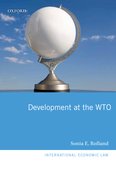
Sonia Rolland's new book "Development at the WTO" seems to be a brilliant exposition of the relationship between "development" and multilateral trade rules. What roles does the developmental agenda have in the context of a rule-based trading regime? Some would argue that the WTO's role and the role of trade rules is not to address the complex issues of development. Other disagree and posit that the developmental agenda is very much, or should be, a central part of the multilateral system. The book takes us through the complexities of this debate and touches upon many pertinent issues like "policy space, developing countries interests at the WTO and "non-trade" issues like labour, environment being part of the agenda.
The Introduction, which is only accessible online (and which is what I have read), puts forth two views of development in the context of the WTO:
1. Development as an Idiosyncrasy
2. Development as a Normative Co-constitutent
As the Introduction states:
"The first paradigm treats development as a second-order normative considera- tion that does not fundamentally displace the objective of trade liberalization as the primary mandate of the WTO. In this framework, the needs of develop- ing members arising out of their economic, social, and political constraints are dealt with on a case-by-case basis rather than at a systemic level. Exceptions and carve-outs dealing with development issues, whether in general agreements or in individual members’ schedules of commitments and accession protocols, are idiosyncratic—ad hoc solutions rather than instantiations of an overarching normative principle.
The key feature of the idiosyncratic paradigm is the absence of a principled approach to incorporating development at the WTO. Of course, that does not mean that no development issues will be included in WTO rules, but simply that there will be no systematic or coherent approach, no overarching legal obligation, or, at best, only a very loose and soft one, such as the statements in the preamble to the Marrakesh Agreement."
Explaining the Normative Co-constituent concept, she states:
"In this paradigm, development constraints are balanced against the trade liber- alization objective of the WTO. Unlike the more pragmatic underpinning of the idiosyncratic model, this paradigm has an explicit normative underpinning. As a result, the need for derogations, safeguards, and escape clauses should be reduced because the mainstream rules are designed to account for development concerns. The issue then is how the WTO legal architecture would be redrawn if develop- ment were to be on par with trade liberalization."
Which stand should a developing country take in terms of addressing development at the WTO? IS there a unified stand of all developing countries? Would the stand of China, India and Brazil be the same at the negotiating table? What impact would consideration of "development" as a source of differential treatment have on the "formal equality" that WTO rules professes? Should countries with differing levels of development be treated differently at the WTO, much more than the SDT provisions presently available? Should unequals be treated unequally? Treating countries that are on different stages of their development path equally, some would say, is a very discriminatory and unjust treatment. How does this fit into the "same rules for all - big or small" paradigm?
This Book sure does offer some very interesting insights into the complex relationship between trade, development and multilateral rules - dilemmas to be addressed.
No comments:
Post a Comment